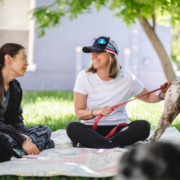American Alternative to Psychiatric Hospitalization Revived in Israel
 Traditional approaches to treating psychosis and other serious mental health conditions frequently involve hospitalization and the prescription of powerful medications. Critics argue they are often ineffective and involve the risk of serious adverse effects.
Traditional approaches to treating psychosis and other serious mental health conditions frequently involve hospitalization and the prescription of powerful medications. Critics argue they are often ineffective and involve the risk of serious adverse effects.
The Soteria model was meant to be an effective alternative to psychiatric hospitalization, preserving patients’ personal power, social networks, and communal responsibilities. The original project was founded by psychiatrist Loren Mosher in San Jose, California, in 1971.
A second Soteria facility opened in 1974 near San Francisco. Mosher was influenced by the philosophy of moral treatment, previous experimental therapeutic communities, and Freudian psychoanalysis. The name Soteria is derived from the Greek word for “salvation” or “deliverance.” Soteria or Soteria-based houses are currently run in the United States, Sweden, Germany, Switzerland, and other countries.
The Soteria concept recently received an upgrade in Israel. In an article for Psychology Today, John Read reported on the successes and challenges of three new Soteria-style houses in Jerusalem and Tel Aviv.
Read was delighted to be invited himself to the opening of the first of the three Soteria-Israel houses in 2016 in Jerusalem. “The warm, relaxed atmosphere in the house was such that it took some time before I could tell who were residents and who were staff,” he remembered. “Not being a religious person I had mixed feelings about the presence of a rabbi until it was explained to me that the person in question was not a rabbi but a resident who sometimes liked to be a rabbi, which seemed to bother nobody.”
Friedlander, Tzur-Bitan, and Lichtenberg evaluated the Israeli Soteria homes. While “crucial components of the original model were preserved … others had to be altered,” they reported in “The Soteria model: implementing an alternative to acute psychiatric hospitalization in Israel.”
The researchers presented eight basic principles for the functioning of Soteria: “care is given in a home, not an institution; groups are small, eight or less; communication is open; activities are client-centered; treatment is consensual; medication is de-emphasized; staff learns to ‘be with’ the resident empathically and non-judgmentally, and the group is the central therapeutic instrument.”
“The heart of the staff remained the ‘companions’, usually students or individuals with personal experience of acute emotional crises,” Friedlander, Tzur-Bitan, and Lichtenberg explained. “These companions were instructed, as in the original Soteria, to cultivate a therapeutic community, with a warm and non-hierarchical atmosphere, blurring the differences between staff and residents.“
Participation and empowerment of patients are key ingredients of the model. “Medication was not considered the first line of treatment, and when used, was understood to be mainly symptomatic treatment—drug-centered and not disease-centered. Its use was not forbidden (contrary to the original Soteria during the first six weeks of the stay), nor was it mandatory, except in exceptional cases where there was a concern for the safety of the residents or their environment. As with all treatment decisions, considerations pro and con were discussed candidly with the resident.”
As Read pointed out in Psychology Today, “the Soteria model is by no means the only alternative to the traditional ‘medical model’ approach of label (diagnose), medicate and, when that fails, hospitalize.”
A similar treatment alternative to psychiatric hospitalization is available at Colorado Recovery. Our Warner Model emphasizes empowerment, integration, and self-actualization. The late Dr. Richard Warner was internationally known for his groundbreaking approach to mental health treatment and for the new model of treatment he created, based on a warmer and more familial setting, comprehensive levels of care that result in a path of self-reliance, and community engagement for connection and a feeling of contribution.
The Treehouse at Colorado Recovery is a social-vocational center run by and for our clients. The program helps prepare them for success in relationships, volunteer work, education and training, internships, and job placements.
At Colorado Recovery it is our mission to help adults with serious mental health issues stabilize their illness, minimize symptoms, improve functioning and enhance each person’s social inclusion, quality of life, and sense of meaning in life.
If you have questions about our recovery model or our services to treat schizophrenia, bipolar disorder, and similar mental illnesses, call us at 720-218-4068 to discuss treatment options for you or the person you would like to help.





